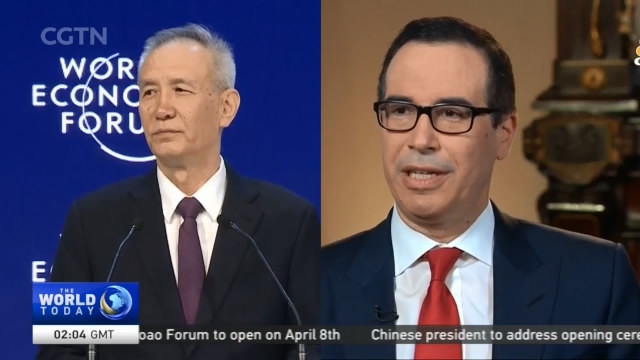
10:37, 03-Apr-2018
China-US Trade Tensions: Wall Street tumbles on news of China tariffs on 128 US products

Fears of a trade war between China and the United States are intensifying. China has retaliated against US steel and aluminum tariffs with restrictions of its own. Beijing has identified 128 US products in which tariffs will be increased from 15 percent to 25 percent. As CGTN's Nathan King tells us it looks like the start of a trade war.
Pork, nuts, fruit, wine-in total, about three billion dollars' worth of tariffs announced by Beijing - in response to US steel and aluminum tariffs. It's a calibrated response - not yet a trade war - but China isn't backing down either.
CUI TIANKAI CHINESE AMBASSADOR TO THE US "We will certainly take counter-measures of the same proportion and the same scale, same intensity."
While these tariffs are significant, China is, for now, largely holding back on imposing tariffs on key US exports to China like soybeans, which is now a 14 billion dollar a year market. Beijing's reaction will depend on another set of China-specific tariffs the US is preparing, which could be announced this week.
HUO JIANGUO, VICE CHAIRMAN CHINA SOCIETY FOR WORLD TRADE ORGANIZATION STUDIES "I think the scope of tariffs is still limited. It fails to touch the main nerves of America, as most of the items are agricultural products from small-scale production. In fact, China imports nearly one-third of its soybeans. If China levies tariffs on imports of soybeans that would give much pressure to the US government, and may affect the Republicans' mid-term election."
There are direct talks about a solution - US Treasury Secretary Steve Mnuchin is reportedly in contact with China's top economics official Liu He. But US President Trump says he wants 100 billion dollars slashed from the US-China trade deficit. Imposing punitive tariffs on China over the trade imbalance and forced transfers of intellectual property from US companies could be just the beginning.
NATHAN KING WASHINGTON "As well as more US tariffs expected to be announced this week the US is also considering deep restriction on Chinese investment in the US - sectors from semiconductors, cell phones, artificial intelligence and beyond. Today this may be a trade dispute but could become a battle for the industries of tomorrow. Nathan King, CGTN, Washington.

SITEMAP
Copyright © 2018 CGTN. Beijing ICP prepared NO.16065310-3
Copyright © 2018 CGTN. Beijing ICP prepared NO.16065310-3